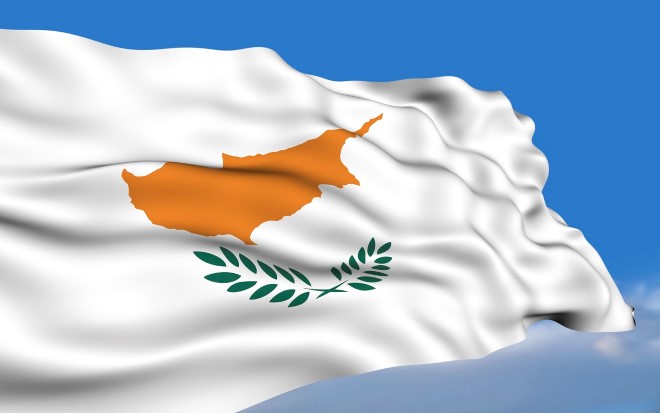As we explained in a previous article posted here a post-modern, still very real coup d’ etat is now executed, with the aim of turning a second member of the EU, after Greece, the Republic of Cyprus into a protectorate (or, alternatively, of creating the mechanisms for the eruption of a Bosnia or Syria type conflict in Cyprus) (http://www.defenddemocracy.
This coup is organized by the most extremist forces inside the international establishment, with the support and participation of the European Commission, ready to apply any bad idea, especially if it’s coming from across the Atlantic, or. Especially concerning Cyprus, from London. They are using also their influence on the President of the Republic of Cyprus himself, accused of acting under direct international blackmail and the Athens government.
The aim of this operation is to deny to the inhabitants of the island to rule their country, deemed too important, from a strategic point of view, to be let to themselves. A number of other reasons have now been probably added to this permanent goal. We cannot exclude that this whole operation is nothing else than preparation for a new big war in the Middle East. Crises in Cyprus in the past have always preceded wars in the Middle East.
We are publishing here a letter by the British ex-diplomat, Professor William Mallinson to the London Review of Books, commenting on an article on Cyprus by Perry Anderson which was published in the same review (http://www.defenddemocracy.
It contains precious information on the roots of the always present past of this conflict. William Mallinson is author of many books on Cyprus and on Greece.
His latest books are Kissinger and the Invasion of Cyprus and The threat of Geopolitics to International Relations, both by Cambridge Scholars Publishing, 2016.
Letter from William Mallinson
Letter to the London Review of Books Vol. 30 No. 10 ·
Cover date: 22 May 2008
The Divisions of Cyprus
From William Mallinson
Perry Anderson’s ‘The Divisions of Cyprus’ is a skilful synthesis, but his account should be corrected on a number of points (LRB, 24 April). To say that Cyprus ‘remained unaffected by the national awakening that produced’ Greek independence is wide of the mark. In 1821, on a charge of conspiring with the insurgents in Greece, the Ottomans hanged Archbishop Kyprianos, beheaded his archdeacon and three bishops, then proceeded to indulge in some ‘collateral damage’; General Thomas Gordon wrote a few years later that the whole of Cyprus was subjected to rape and bloodshed. By the 1890s, the Colonial Office had given up trying to ignore demands for union with Greece: ‘It is only rational,’ Winston Churchill said in 1907, ‘that the Cypriot people who are of Greek descent should regard their incorporation with what can be called their mother country as an ideal to be earnestly, devoutly and fervently cherished.’ Indeed, during the Greek Civil War of 1947-49, Britain was considering uniting Cyprus and Greece to strengthen Greece in the fight against Communism. A senior under-secretary in the Foreign Office, Oliver Harvey, wrote in 1947: The action of HM Government in India and Burma has enormously impressed opinion throughout the world. Our proposed evacuation policy in Palestine and the possibility that we may propose independence for Cyrenaica, when coupled with what we have done in India and Burma, makes our continued presence in Cyprus indefensible. I understand that Cyprus has been rejected by the Chiefs of Staff as unsuitable for any long-term strategic purpose . . . It can hardly be questioned that Greece, who has governed Crete effectively, and has now been given the Dodecanese, can equally well govern Cyprus (there is a small Turkish minority there whose rights would be secured) . . . it would be the greatest possible contribution to Greek morale and British influence . . . I would strongly advocate that consideration be given to the very early cession of Cyprus to Greece, before the Cypriot campaign is embittered by violence and before cession can be represented as yielding to force. Another senior official responded: ‘In more normal circumstances, the early cession of Cyprus to Greece might well be a wise policy, justified by considerations not only of justice, but also of expediency. But present circumstances are not normal.’ The FO remained intransigent, despite Harvey’s arguments (and those of the British ambassador in Athens), and, while the Civil War grew increasingly bitter, Britain opted for confrontation in Cyprus, the essential reason being its fear of Russian power in the Eastern Mediterranean, which dated from the end of the 1700s. Like Robert Holland in Britain and the Revolt in Cyprus, 1954-59, Anderson refers only fleetingly to the 1955 three-power conference in London (in which Turkey should not have been allowed to participate, as is evident from Article 16 of the Treaty of Lausanne), whose purpose the permanent under-secretary at the FO, Ivone Kirkpatrick, made abundantly clear: I have always been attracted by the idea of a three-power conference, simply because I believe that it would seriously embarrass the Greek Government. And if any such conference were held, I should not produce any British plan or proposal until a Greek-Turkish deadlock has been defined. The foreign secretary, Harold Macmillan, told the cabinet: ‘Throughout the negotiations our aim would be to bring the Greeks up against the Turkish refusal to accept Enosis and so condition them to accept a solution which would leave sovereignty in our hands.’ This was ‘divide and rule’ at its crudest. Turning to the role of the US after Cyprus gained independence in 1960, Anderson writes that Turkey’s threats to invade the island in 1964 were quashed by a blunt message from President Johnson. In fact what the documents show is that Britain and the US would not have resisted a Turkish invasion; it was a Russian threat to intervene that caused the US to change its mind.
The following extract from a telegram from the British Embassy in Washington to the FO in July 1964 reveals the true picture: The Americans have made it quite clear that there would be no question of using the 6th Fleet to prevent any possible Turkish invasion . . . We could not agree to UNFICYP [UN forces in Cyprus] being used for the purpose of repelling external invasion, and the standing orders to our troops outside UNFICYP are to withdraw into the sovereign base areas immediately any such intervention takes place. Ten years later, when Makarios was overthrown by the Greek Colonels, there were no comparable threats from the Soviet Union, which had little reason to feel friendly towards the junta in Athens, the anglophile acting president in Nicosia, Glafkos Clerides, or the subsequent Karamanlis government in Greece, and the Turkish invasion went ahead unimpeded. So far as the British part in the 1974 crisis goes, I recently discovered that Callaghan (aided and abetted by three FO minders) lied to the Parliamentary Select Committee about his foreknowledge of the invasion, denying that he knew of any Turkish plans to invade. Yet shortly before the Turkish landing the Joint Intelligence Committee had already informed Callaghan’s private secretary that Turkey had plans to invade Cyprus within a few days. Then, while the Turkish army continued to advance (in defiance of the ceasefire), and during Callaghan’s frenetic talks with Greek and Turkish leaders in Geneva, the assistant chief of defence staff informed Callaghan of the ‘likely Turkish plans’ to take over more than one third of the island, even specifying the areas to be taken. How far was British policy influenced by the Sovereign Base Areas and the 1960 treaties that established the semi-independent Republic of Cyprus? Britain’s position on the bases was much more equivocal than comes across in Anderson’s article. In the late 1960s, the FO and the Law Lords were admitting that the Treaty of Guarantee was completely overridden by Article 103 of the UN Charter and contrary to Article 2.4. At various points, indeed, Britain tried to withdraw from its bases altogether. In 1975, an FO paper stated: ‘Although our preferred policy is for a complete British military withdrawal from Cyprus, we recognise that we cannot do so at present given the global importance of working closely with the Americans.’ The same paper gave prominence to Kissinger’s view that Britain must ‘hang onto this square of the world chequerboard’. Subsequent papers reveal that Britain continued, at the highest levels, to try to give up its bases but always succumbed to US pressure not to do so. There was even an idea that the US might finance the bases. Finally, the Annan Plan. Anderson might have noted that not only were the illegal Turkish settlers allowed to vote on it: so were the occupying troops of the Turkish army. Still more farcically, the full plan was only released onto the UN website one minute before midnight on the day of the referendum. The plan was simply another ploy to keep Cyprus out of mainstream EU security structures: hence the desperation during the fraught negotiation process to have the Greek and Turkish governments sign a ‘foundation agreement’ resuscitating the failed 1960 treaties, and obliging the Greek and Cypriot governments to support Turkey’s accession to the EU. Britain, and its foreign policy master, the United States, wish to use Cyprus to hinder Russian influence in the Eastern Mediterranean, just as Britain has always done.
William Mallinson Ionian University, Corfu
Also look











